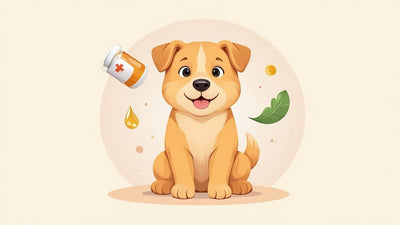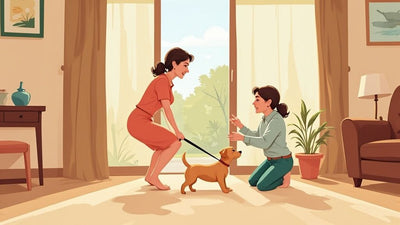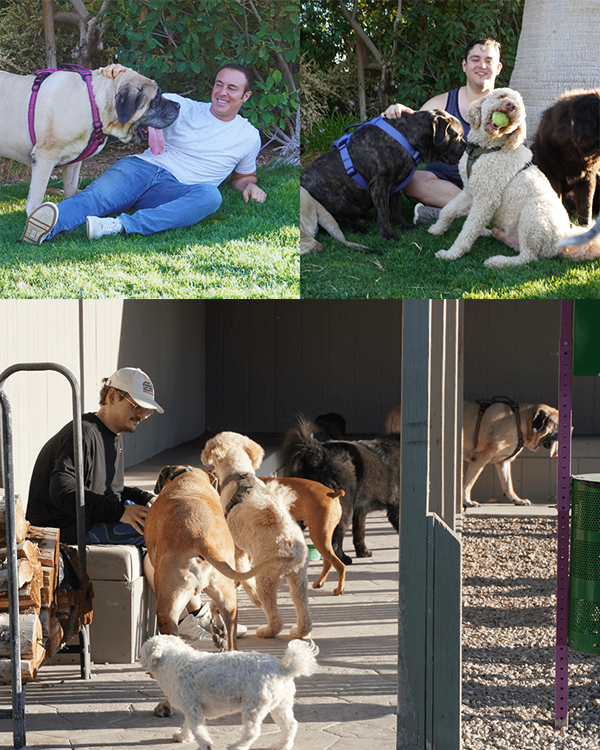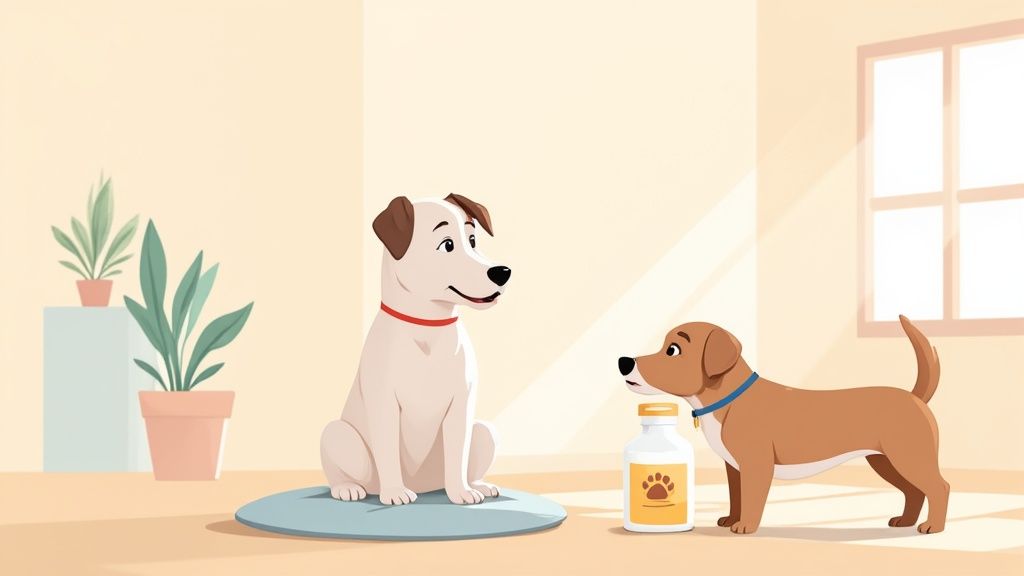
Gentle Support for Your Dog's Anxiety
When your veterinarian brings up the idea of anxiety medication for your dog, it's not a sign of failure. It's an act of love. These are tools to support your dog’s mental well-being, helping to rebalance their brain chemistry and create a sense of comfort. This can make training and simply navigating daily life so much more manageable for a worried dog.
Understanding Your Dog’s Anxiety
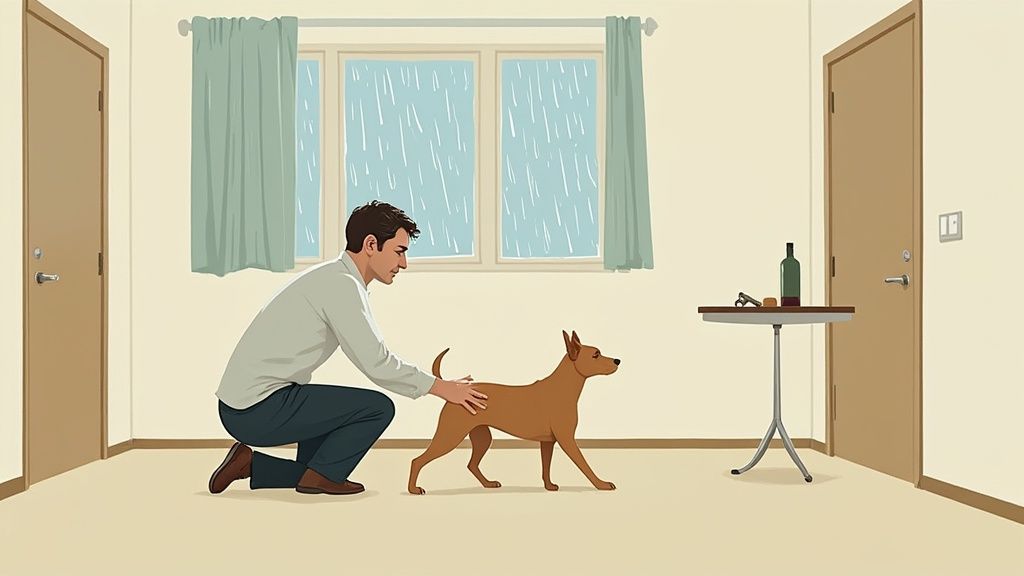
You know the look. That quiet worry you feel when your dog starts pacing endlessly during a thunderstorm, or the heartbroken whine you hear the second you grab your keys. We understand. You're not alone on this journey, and that gut feeling that something isn’t quite right is worth listening to.
Anxiety in dogs is a real, manageable condition. It’s not just "bad behavior"; it's a persistent state of unease that can seriously impact their quality of life. Considering every option is about giving your best friend more peaceful, comfortable days.
Distinguishing Normal Fear From Anxiety
All dogs get scared sometimes. A loud firework or a trip to the vet will naturally make most dogs nervous. Anxiety, however, looks a bit different. It’s a recurring pattern of behavior that feels out of proportion to the situation or becomes a constant backdrop to your dog's life.
To help you tell the difference, here’s a quick guide to what might be going on behind those worried eyes.
Is It Anxiety? Common Signs to Watch For
| Behavioral Sign | What It Might Look Like | Potential Anxiety Trigger |
|---|---|---|
| Destructive Behavior | Chewing on doorframes, shredding cushions, digging at windowsills—often only when you're gone. | Separation from you. |
| Restlessness | Constant pacing, inability to settle down, panting even when it's not hot. | Predictable events like storms, car rides, or even nighttime. |
| Excessive Vocalization | Barking, whining, or howling that seems to have no clear cause or trigger. | Loneliness, boredom, or a generalized state of unease. |
| Inappropriate Elimination | Urinating or defecating indoors, even though your dog is fully house-trained. | Stress from being alone or a specific phobia (like loud noises). |
Recognizing these patterns is the first real step toward getting your dog the support they need. Our guide to canine anxiety and behavior offers a deeper dive into what these signs can mean.
The Growing Awareness of Canine Mental Health
You’re part of a growing movement of pet parents who understand that a dog's mental health is just as vital as their physical health. This shift in awareness is changing everything. The global market for dog relaxants, valued at around USD 186.2 million, is projected to more than double by 2035, hitting an estimated USD 505.3 million.
This isn't just a business trend; it shows how many families like yours are actively seeking solutions for their companions. You can explore this market growth at metatechinsights.com.
"Considering medication for your dog’s anxiety isn't giving up; it’s stepping up. It’s a proactive choice to improve their comfort and restore their ability to enjoy life with you."
When to Talk to Your Veterinarian
If you’ve noticed these signs becoming more frequent or intense, the most supportive thing you can do is have a chat with your veterinarian. Your vet is your partner on this journey.
Their first step will be to rule out any underlying medical issues, like chronic pain or cognitive changes, that could be mimicking anxiety. This conversation is about collaboration, not judgment. Come prepared with notes on the specific behaviors you've seen and when they happen. This helps your vet get the full picture.
Together, you can explore every option—from simple environmental tweaks and training support to gentle supplements and, when necessary, prescription medication. The goal is always the same: more good days together.
Get Your FREE Dog Brain Health Guide

Get instant FREE access to today's top ways to help your best friend live a longer, healthier, happier life.
- 39 value-packed pages of expert insights
- Early-detection tips for cognitive decline
- Top brain-boosting superfoods
- Vet-approved mental sharpness strategies
- Fun IQ tests for your dog
How Anxiety Medications Can Help Your Dog
When your veterinarian brings up medication, it’s natural to feel a little hesitant. The world of canine anxiety drugs can seem complex, but let’s break it down together. These aren't personality-erasers; think of them as tools to help support your dog's brain chemistry.
The goal is to turn down the volume on their fear and worry. This allows them to actually hear your reassuring voice and engage with training again, creating a bridge back to a calmer state of mind.
SSRIs: For a More Stable Mood
You’ve probably heard of fluoxetine—its dog-specific brand name is often Reconcile®. This is part of a group called Selective Serotonin Reuptake Inhibitors, or SSRIs. It's a technical term, but the concept is pretty straightforward.
Think of serotonin as your dog's natural "feel-good" chemical messenger. In a dog with anxiety, that messenger might not be sticking around long enough to deliver its calming message. SSRIs help keep that serotonin active in the brain for longer, creating a more stable, less anxious emotional baseline over time.
- Best For: Long-term issues like generalized anxiety, severe separation distress, or compulsive behaviors (like obsessive tail chasing).
- Time to Effect: This isn't an overnight change. Building up a stable level takes time, so you'll typically see the full benefits in about 4-6 weeks.
TCAs: A Classic Approach to Mood Support
Tricyclic Antidepressants, or TCAs, are another class of medication your vet might discuss. Clomipramine (sold as Clomicalm®) is a common one. They’re an older group of drugs but work similarly to SSRIs by helping important brain messengers like serotonin and norepinephrine do their job more effectively.
For some dogs, especially those with certain types of anxiety or compulsive disorders, TCAs can be a fantastic option. Your vet knows your dog's full health picture and will weigh all the factors to decide if this is the right path.
Benzodiazepines: Fast-Acting Relief for Panic
Now, let's talk about those really intense, predictable scary moments—like thunderstorms or the Fourth of July fireworks. This is where Benzodiazepines (like alprazolam) come in. Think of them as a "panic button" medication.
They work quickly to dial down the intense physical and emotional feelings of fear. Unlike the daily mood stabilizers, these are used only as needed for specific, high-stress events, offering powerful, short-term relief.
We measure progress not in perfect behavior, but in peaceful nights and moments of comfort. Medication can be a bridge to help your dog find those moments again, making them more receptive to the love and training you provide.
To make this even clearer, here's a quick side-by-side look at how these drug classes differ.
Comparing Common Anxiety Medication Types
This table gives you an at-a-glance comparison of these common options, helping you understand where each one fits in a potential support plan.
| Medication Type | How It Helps (Simple Terms) | Best For | Time to Effect |
|---|---|---|---|
| SSRIs | Increases "feel-good" serotonin in the brain | Daily, long-term generalized anxiety | 4-6 Weeks |
| TCAs | Increases serotonin and norepinephrine | Daily, long-term anxiety & compulsive behaviors | 2-4 Weeks |
| Benzodiazepines | Quickly calms the central nervous system | Short-term, situational panic (e.g., storms) | 30-60 Minutes |
Each medication has a unique role, and sometimes vets will use them in combination to address both underlying anxiety and sudden triggers.
The growing awareness of our pets' mental health is undeniable. The global market for canine anxiety medications was valued at USD 370.2 million and is projected to skyrocket to USD 2.34 billion by 2033. This surge, as noted in a report on dataintelo.com, highlights how seriously owners and vets are taking our dogs' emotional well-being.
Getting familiar with these options empowers you to have a more confident conversation with your vet. To learn about all the ways you can help your companion, from behavior modification to supportive supplements, explore our complete guide on managing canine anxiety.
Partnering With Your Vet for Anxiety Care
Figuring out the world of canine anxiety drugs isn't something you should ever have to do alone. This is a journey you take with your veterinarian, a hopeful partnership aimed at helping your best friend feel better. Just considering this step shows you’re a dedicated advocate for your dog's well-being.
Think of yourself as the expert on your dog's daily life, because you are. Before you even head to the clinic, take some time to be a keen observer. Your insights are the single most valuable tool your vet has for piecing together what’s really going on.
Preparing for a Productive Conversation
A few simple notes can transform a worried conversation into a focused, productive planning session. The small details are what help your veterinarian connect the dots between your dog’s behavior and the potential root causes.
Here’s a good starting point for your notes:
- Specific Behaviors: Instead of just saying your dog is "anxious," be specific. Is it "endless pacing by the back door" or "trembling every time the garbage truck comes by"?
- Timing and Triggers: Does the behavior happen every single time you leave for work? Only during thunderstorms? Or does it seem to pop up out of nowhere?
- Recent Changes: Think about any shifts in your home life. A new work schedule, a recent move, or even a new family member can all be important clues.
This kind of information is gold for your vet. It allows them to start with the most crucial first step: ruling out underlying medical problems. Things like chronic pain, thyroid imbalances, or cognitive decline can often masquerade as anxiety. A thorough physical exam ensures you're both tackling the right problem from the very beginning.
The 'Start Low and Go Slow' Approach
Once any physical health issues are off the table, your vet will talk you through a comprehensive care plan. If medication seems like a good fit, they will follow a very careful and methodical process to find what works for your individual dog.
The guiding principle is always to "start low and go slow."
This means they’ll begin with the lowest possible effective dose. The goal is never to sedate your dog, but to gently dial down their distress so they can feel more comfortable, secure, and ready to learn new, calmer ways of coping. Every dog’s chemistry is unique, so finding that perfect balance can take a bit of patience.
The infographic below breaks down the main categories of medications your vet might discuss. Each one plays a different role in supporting your dog’s mental health.
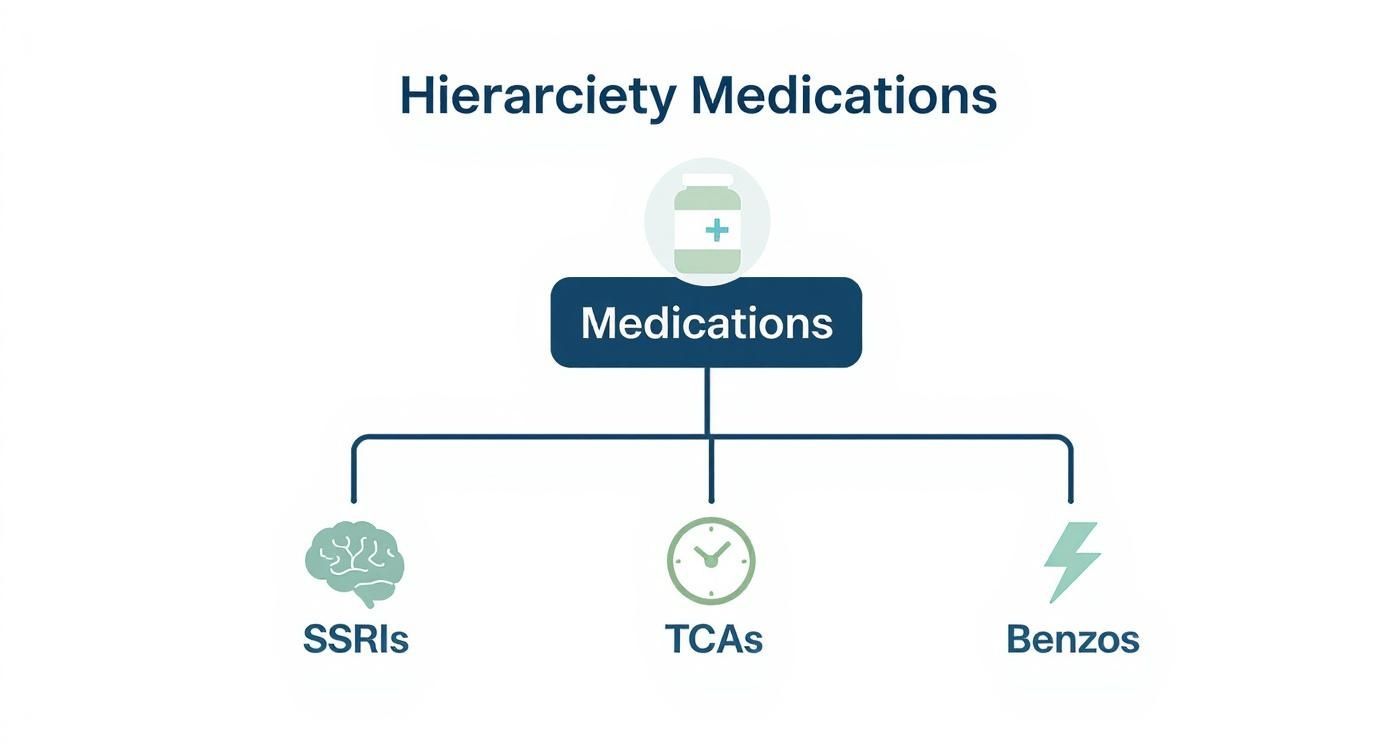
As you can see, some medications are designed for long-term, daily mood regulation, while others offer fast-acting relief for specific, predictable stressful events.
We get it—this can feel like a big step. But remember, the goal is simple: to give your dog relief. It’s about restoring their ability to feel safe in their own home and enjoy their life with you again.
The market for these solutions is growing because countless pet owners are looking for the same relief you are. Canine anxiety medications are a significant part of the larger pet calming products market, which was valued at around USD 18.36 billion globally. With over 66% of U.S. households now owning pets, the demand for effective, safe support is undeniable. You can discover more insights about this trend on futuremarketinsights.com.
As you and your vet work together, remember that other gentle options can complement this medical journey. For instance, our NeuroChew supplement is specifically formulated to support brain health and promote mental clarity, which can provide a wonderful foundation for a calmer demeanor. Your vet is the best resource for creating a complete, multi-faceted plan to bring more good days back into your dog's life.
Creating a Calm Environment to Complement Medication
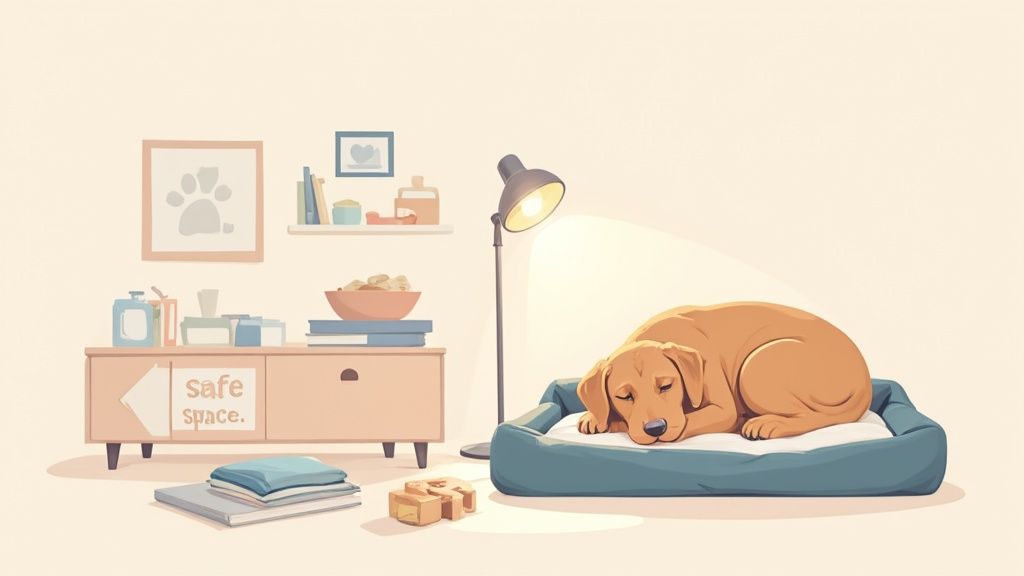
While medication for canine anxiety can be a game-changer, it rarely works in isolation. The best progress happens when we pair a vet-prescribed plan with a supportive, calming home environment. Think of it this way: the medication helps support the brain chemistry, while you create a world where your dog feels fundamentally safe and secure.
This isn't about overhauling your entire life. It’s about making small, thoughtful adjustments to your daily routine that build a foundation of stability. These simple changes can dramatically reduce your dog's overall stress load, making it easier for the medication to do its job effectively.
The Power of a Predictable Routine
For an anxious dog, an unpredictable world is a scary world. A consistent daily schedule becomes a comforting anchor, letting them know what to expect and when. When mealtimes, walks, and bedtime happen at roughly the same time each day, they aren't left wondering and worrying about what's coming next.
This predictability gives them a sense of control over their environment, which is a powerful way to support their comfort. You're not aiming for military-style rigidity, just a familiar rhythm that helps lower their baseline stress.
Creating a Safe Space for Comfort
Every dog needs a den—a quiet, cozy spot that is theirs and theirs alone. This isn't a time-out corner; it's a sanctuary where they know they will never be bothered.
- Make It Cozy: Find a low-traffic spot and fill it with soft bedding and a favorite toy. Some dogs prefer covered crates that feel more enclosed and den-like.
- Use Positive Associations: This is the perfect place to give them a special chew toy or a food puzzle. You want them to think of this spot as the place where good, calm things happen.
- Respect Their Privacy: When your dog retreats to their safe space, it’s a “do not disturb” sign. This rule teaches them they have a reliable place to go when they feel overwhelmed.
By giving them this personal haven, you're empowering them with a tool to self-soothe. They learn they can take themselves out of a stressful situation, which builds incredible confidence.
We measure progress in quiet moments—a dog choosing to rest in their bed during a storm instead of pacing, or a gentle sigh of contentment. These are the small wins that truly matter.
Gentle Behavior and Enrichment Techniques
An anxious mind often has too much nervous energy with nowhere to go. Environmental enrichment gives that brain a healthy job to do, redirecting focus from worry to productive activity. It's a critical piece of the puzzle for any dog on an anxiety support plan.
Try working these simple ideas into your dog’s day:
- Puzzle Toys: Ditch the food bowl and use a puzzle feeder or snuffle mat instead. This turns mealtime into a calming mental workout that taps into their natural instinct to forage.
- Scent Work: You don’t need any special gear for this. Just hide a few high-value treats around the living room and encourage your dog to "go find it!" Using their nose is incredibly satisfying for a dog and builds confidence with every successful discovery.
- Calm Reinforcement: Catch your dog being calm. When you see them lying down and relaxed, quietly walk by and drop a small treat between their paws without making a big fuss. This subtly teaches them that being settled is a rewarding behavior.
When you combine these environmental and behavioral supports with the right canine anxiety drugs from your veterinarian, you’re creating a truly holistic plan. You’re supporting their brain chemistry and nurturing their emotional well-being, paving the way for many more calm, happy days together.

Support Your Dog's Brain Health with NeuroChew™
As mentioned in this article, NeuroChew is the first dog chew designed to support both cognitive function and healthy circulation. Perfect for dogs showing early signs of cognitive decline or for proactive brain health support.
Natural Supplements and Gentle Calming Aids
Before considering prescription medications, many of us want to see if there’s a gentler way to help our anxious dogs. It's a perfectly reasonable and caring first step, especially for pups with milder stress or those who just need a bit of extra support to feel safe and sound.
Natural supplements aren't a direct replacement for prescription drugs. Instead of thinking of them as a "treatment," it's better to view them as gentle support systems. They work to foster a sense of calm and help maintain a balanced mood, making them a fantastic piece of a bigger puzzle that includes a peaceful environment and consistent, loving routines.
Key Ingredients That Can Help
As you explore natural calming aids, you'll start to see a few ingredients pop up again and again. These aren't magic bullets, but they do have properties that can gently support a worried dog. Knowing a little about how they work can make you feel more confident about what you’re choosing.
- L-Theanine: An amino acid found in green tea, L-Theanine is known for encouraging relaxation without making your dog sleepy. It helps support the brain's "it's okay to chill out" signals.
- Tryptophan: You've probably heard of this one around Thanksgiving. It's an essential amino acid that the body uses to create serotonin—the brain's own "feel-good" chemical that plays a huge role in mood stability.
- Chamomile: Just like the comforting tea we sip to wind down, chamomile has compounds that can have a mild, soothing effect on the nervous system.
- Valerian Root: People have used this herb for centuries to ease tension and promote restful sleep, and it can offer similar gentle benefits for our pets.
Supporting your dog's overall brain health is another smart angle. A brain that's getting the right nutrients is simply better at coping with stress. Ingredients like Phosphatidylserine can help support cognitive function and mental clarity, which is especially helpful for senior dogs whose anxiety might stem from confusion.
Setting Realistic Expectations
It’s crucial to go into this with the right mindset. These gentle aids are at their best when dealing with mild, situational stress—think a dog who gets a little antsy in the car or feels uneasy when new people come over. They typically aren't strong enough to tackle severe separation anxiety or deep-seated phobias all on their own.
Here's a good way to think about it: if your dog's anxiety is a little smoldering campfire, natural aids can help keep it from flaring up. But if you're dealing with a full-on forest fire, you're going to need the more powerful help of a veterinarian and likely a prescription.
Small improvements are big wins. When your dog settles down five minutes faster after you leave or sleeps right through a distant rumble of thunder, that’s a victory. It tells you you’re on the right track.
The goal here is progress, not perfection. Supplements can be an excellent tool in your dog's wellness kit, but they shine brightest when paired with positive behavioral training and a secure, predictable home life.
The Most Important Step: Always Talk to Your Vet
Even though you can buy supplements over the counter, it's absolutely essential to have a conversation with your veterinarian before starting anything new. The word "natural" doesn't automatically mean "risk-free." Some herbs can interact with other medications or might not be right for a dog with a specific health condition.
Think of your vet as your co-pilot on this journey. They can help you:
- Rule out any underlying medical problems that might be masquerading as anxiety.
- Pick a high-quality product with ingredients that are safe and appropriate for your individual dog.
- Make sure a new supplement won’t cause problems with any other medications your dog is taking.
This quick chat is a simple but vital step to ensure you're helping your dog in the safest, most effective way possible. If you're curious about other herbal options, our guide on whether dogs can have Ashwagandha takes a deep dive into another popular calming herb. By working closely with your vet, you can confidently add gentle, natural support to your dog's routine, helping them feel more comfortable and secure in their world.
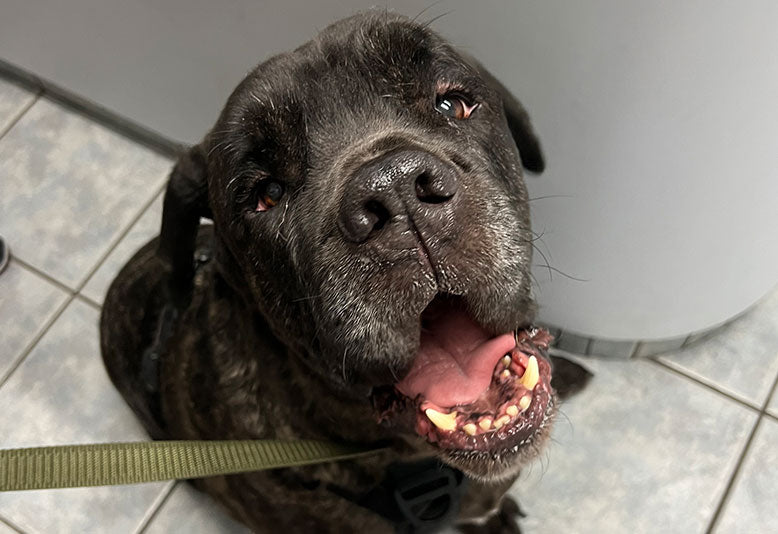
Real Results: How NeuroChew Helped Brutus Regain His Mental Clarity
Brutus was getting disoriented at night. After starting NeuroChew, he's more happy during the day and steady at night. He's back to his old self!
Your Journey Together Toward More Good Days
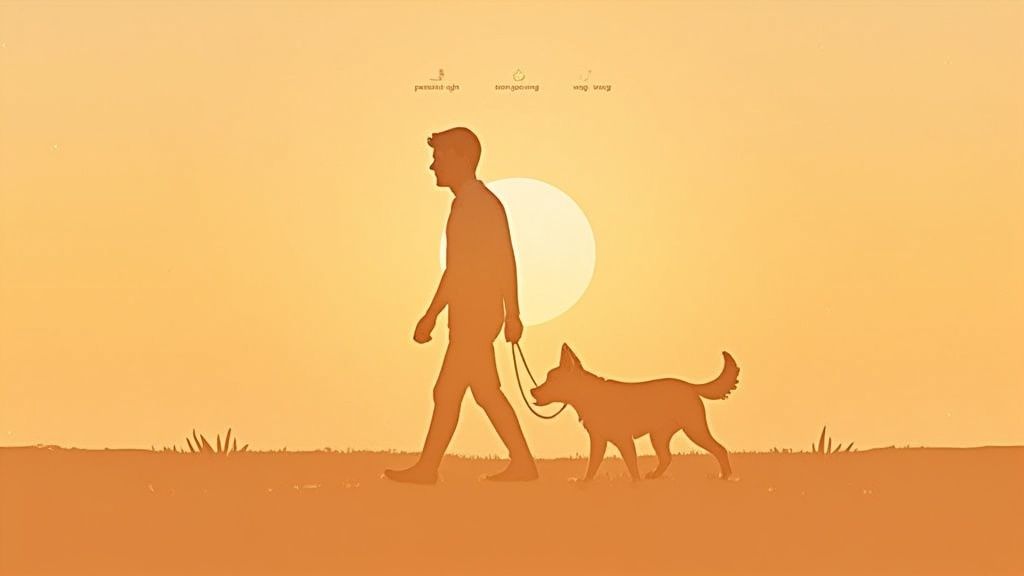
Trying to figure out canine anxiety drugs, calming supplements, and training techniques can feel like a lot to take on. But through all the research and appointments, remember this: you are your dog’s biggest champion.
This journey is about the quiet, shared goal of stacking the deck in favor of having more good days together.
You're not the only one going through this. Every person who has felt their stomach sink while watching their dog shake during a storm or hide from visitors knows this feeling well. Your dedication to finding a solution speaks volumes about the bond you two share.
Celebrating the Small Wins
Real progress often isn't some huge, overnight change. It usually shows up in the small moments, the little victories that mean the world.
These are the things worth celebrating:
- Getting through the night without restless pacing.
- Seeing a soft tail wag when the thunder is still far off.
- Being greeted calmly at the door instead of by frantic barking.
- Watching them choose to relax on their bed instead of scrambling to hide.
These moments are the real signs that your support is making a difference. They show that your dog is starting to feel safe and comfortable in their own skin again.
"Your love and unwavering commitment are the most powerful support you can give. Each step you take, no matter how small, is a step toward their comfort and well-being."
The path forward is a partnership—between you, your dog, and your vet. You now have the knowledge to make informed, hopeful choices that are right for your dog. Every single day you show up with patience and love is a good day. That bond is the foundation for everything else, and it's more than enough.
Frequently Asked Questions
It's completely normal to have a lot of questions when you're considering anxiety medication for your dog. You’re doing the right thing by gathering information to make the best possible choice for your companion. Let's walk through some of the most common concerns we hear from caring dog owners.
How Long Will My Dog Need Anxiety Medication?
There's no one-size-fits-all answer here, as every dog's journey is unique. Think of medication as a tool. For some dogs, it's a short-term support—a kind of scaffolding that provides stability while you work on behavior training. It lowers their anxiety just enough so they can actually learn new, healthier ways to cope without being in a constant state of panic.
For others, especially dogs dealing with more chronic or deep-rooted anxiety, long-term medication might be the best path to a good quality of life. The key is working closely with your veterinarian. They'll help you regularly check in on your dog's progress and decide together what’s best for their happiness and comfort.
Will Medication Change My Dog’s Personality?
This is probably the biggest fear we hear from owners, and it comes from a place of love. You love your dog for who they are! The goal of anxiety medication is never to dull their spirit or change their personality. It’s the exact opposite.
The real aim is to lift the heavy blanket of fear and stress that's hiding their true, joyful self. A correctly dosed medication should help your dog feel more confident and engaged, not sedated. If you notice your dog seems overly tired or just "not themselves," that’s your cue to call the vet. It’s often just a matter of adjusting the dosage or trying a different approach.
Can I Use Natural Supplements With Prescriptions?
Wanting to pair a prescription with more gentle, natural support makes perfect sense. But it is absolutely essential to run this by your veterinarian first. Just because something is labeled "natural" doesn't automatically mean it's safe to combine with medication.
Some herbs and supplements can have powerful effects that interfere with prescription drugs, sometimes making them less effective or amplifying side effects. Your vet is your best partner in creating a safe, holistic plan that supports your dog from every angle. If you're curious about how nutrition plays a role, our guide to dog brain health is a great place to start.
"The true goal is to see your dog's personality shine through again, freed from the weight of constant worry. It's about letting them be themselves, only calmer and more comfortable."
Asking these questions shows you're a dedicated advocate for your dog. Your thoughtful approach is the most critical ingredient for their progress.
At Furever Active, we believe in supporting your dog’s mental clarity and calm demeanor through every stage of life. Our NeuroChew™ supplement is designed to complement your veterinarian's care plan by providing a foundation for brain health. Explore how NeuroChew can support your dog's journey toward more good days.
Share This Article

Support Your Dog's Brain Health with NeuroChew™
The first dog chew that supports both brain function and healthy circulation. Perfect for dogs of all ages.
- Enhances cognitive function & mental clarity
- Reduces anxiety without sedation
- Supports healthy blood circulation
- Made in USA with natural ingredients
60-Day Money-Back Guarantee • Free Shipping



